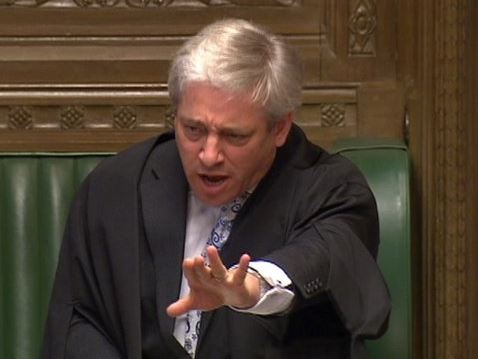In the 2020 general election, British people should be able to choose to vote online, the Digital Democracy Commission (Commission) proposes. There should also be wider participation in Parliamentary debates.
The Commission was set up by the Speaker of the House of Commons to investigate what opportunities digital technology could bring for parliamentary democracy in the UK. It was instructed to make recommendations in January, 2015.
The Commission published its report – ‘Open Up’ – today. It recommends how Parliament could use digital technology to help it become more inclusive, transparent, and engage the public more democratically.

The Rt Hon John Bercow MP thanked the Commission for its report, which was published today.
The Rt Hon John Bercow MP, Speaker of the House of Commons, said regarding the report:
“I set up the Digital Democracy Commission to explore how Parliament could make better use of digital technology to enhance and improve its work.”
“I am very grateful to all those who contributed to the Commission’s work, and have been particularly struck by the enthusiastic contributions from those who expressed a desire to participate in the democratic process, but felt that barriers existed that prevented them from doing so.”
The Commission claims its report provides a comprehensive roadmap to eradicate barriers to public participation. It also includes recommendations to improve the legislative process and facilitate better scrutiny.
Mr. Bercow added:
“In a year where we reflect on our long democratic heritage, it is imperative that we look also to the future and how we can modernise our democracy to meet the changing needs of modern society.”
The Commission also recommends that MPs (Members of Parliament) who have childcare responsibilities or are unwell be allowed to vote in the Commons electronically, without having to be physically present in the chamber.
It proposes ending restrictions on the use of mobile phones by members of the public when they are in the public galleries in the Commons.
Background to the report
The report is the result of a year’s worth of meetings and events, liaising with people across the country face-to-face and electronically, about how digital technology might be used to improve parliamentary democracy.
More than 100 informal meetings and over 20 roundtable discussion were held across the UK. A wide range of people were consulted, including heads of industry, young people, academics, adults with learning difficulties, voluntary organisations, citizens with hearing and visual impediments, civil servants, and marketing & PR experts.
Thousands of tweets were received as well as over 150 longer written contributions.
The Commission members are: Meg Hillier MP; Robert Halfon MP; Paul Kane, President of Community DNS; Helen Milner, Chief Executive of the Tinder Foundation; Professor Cristina Leston-Bandeira, Professor of Politics, University of Hull; Emma Mulqueeny, Founder of Rewired State and Young Rewired State; Femi Oyeniran, Actor, Film maker and Youth Ambassador; and Tony Pearce, President of the National Union of Students.
Citation: “Open up!“ Report of the Speaker’s Commission on Digital Democracy. Published: 26 Jan, 2015.
Video – Digital Democracy Commission Summary
This short summary video, published by the UK Parliament, contains the general conclusions from the Speaker’s Commission on Digital Democracy’s report published on Monday, 26th of January, 2015.
